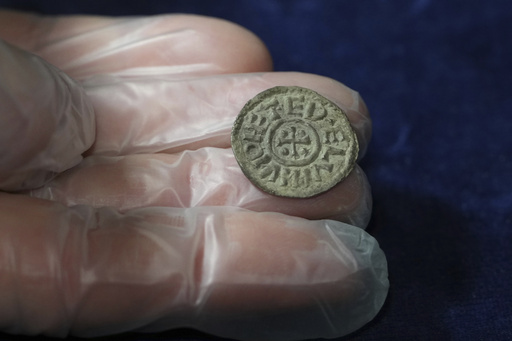LONDON — When Malcolm Weale uncovered a small object covered in dirt while metal detecting in an English field, he immediately recognized its significance.
He had discovered a silver penny that was minted during the reign of Guthrum, a Viking chief who embraced Christianity and governed eastern England in the ninth century under the name Athelstan II. For Weale, this marked the climax of his decades-long passion for metal detecting in the rural landscapes of eastern England.
“I was trembling,” Weale expressed at the British Museum, where the newfound coin was exhibited alongside several other artifacts discovered by amateur historians in the years 2023 and 2024. “I realized this discovery would change my life; it’s truly a remarkable historical find.” Weale mentioned that the excitement of holding the Guthrum penny was especially poignant since he had recently watched the series “Vikings” on Netflix.
The excitement of unearthing fragments of history continues to motivate detectorists like the 54-year-old Weale, who immersed himself in the hobby from the age of seven and quickly found himself captivated by it. The display at the museum coincided with the annual report of the Portable Antiquities Scheme, a government initiative that documents thousands of archaeological findings made by the public annually. The Guthrum penny accompanied a set of bronze tools believed to be over 3,000 years old, a seventh-century gold necklace adorned with garnets, and a gold signet ring that holds an intriguing connection to Queen Elizabeth I.
These remarkable discoveries were officially designated as “treasure” by a coroner, ensuring they will receive independent valuations and be offered to local museums for public display. Contributions from detectorists, beachcombers, and mudlarkers—those who search along river banks—bring fresh insights into British history. The exquisite gold and garnet necklace found in central England’s Lincolnshire area showcases advanced Anglo-Saxon artistry, revealing a surprisingly cosmopolitan history.
According to archaeologist Helen Geake, who works as a finds liaison officer for the antiquities program, it is believed that the necklace was created by English craftsmen—the finest in Europe at the time—utilizing garnets sourced from as far away as Sri Lanka.
Another find was made by 49-year-old Andy Akroyd, who was metal detecting near his home in Bedfordshire, central England. Initially assuming he had unearthed a modern coin, he discovered it was actually a signet ring from the 16th century, intricately engraved with the image of a phoenix—an emblem of rebirth often associated with Elizabeth I. The ring was located in a historic royal hunting ground from the Elizabethan era, suggesting it may have been worn by one of the queen’s allies.
“When you find something like that, it feels like just the beginning of your adventure,” Akroyd remarked, reflecting on the questions that arise with every discovery: “What does this mean? How did it end up here?”
When items are deemed treasure, their value is split between the finder and the landowner. Some detectorists do strike it rich; last year, a collection of coins from around 1,000 years ago that was found in southwest England fetched 4.3 million pounds (approximately $5.3 million). However, for most in this hobby, the thrill of discovery far outweighs any monetary gain, according to Weale.
“You could be a millionaire many times over, but that feeling of finding something significant is priceless,” he declared. Both Weale and Akroyd expressed intentions to return to searching the fields soon, despite the typical dismal English weather.
“You often discover the most remarkable items when it’s raining or chilly,” Weale noted.
They both highlighted the mental health benefits associated with this methodical and unhurried hobby, a concept that gained wider recognition due to the BBC’s light-hearted sitcom “Detectorists.”
“When I’m out there metal detecting, all I think about is history,” Weale shared. “I’m immersed in the lives of kings and queens; nothing else worries me, not even bills. Sometimes, I even forget to eat.”
Akroyd reflected on his experiences in the field, where he may sit peacefully, observing nature as hares dart about and birds of prey glide overhead.
“I lost my dad last year, and when I’m out in the field, I feel like I’m having a conversation with him, asking for guidance on where to go next,” Akroyd recounted. “Unfortunately, he hasn’t managed to point anything out to me yet.”



